Botswana's inspirational women safari guides who are navigating change
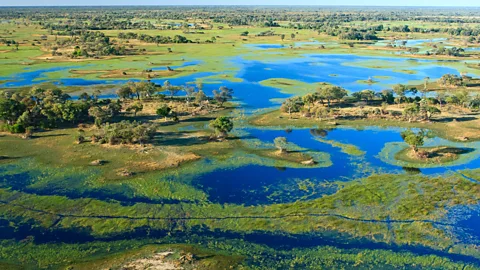 Kelly Cheng Travel Photography/Getty Images
Kelly Cheng Travel Photography/Getty ImagesA remarkable shift is reshaping the traditional landscape of piloting iconic canoes in one of Africa's most extraordinary places – a role that has long been the domain of men.
In the early morning light, before the blistering Botswana sun reaches full heat, the only sounds are the brushing of traditional mokoro canoes as they slide over the grass and slip gently into the glassy waters of the Okavango Delta. Eager tourists sit poised with cameras and smartphones as their mokoro guides, or "polers" as they are known, expertly cast them off from shore with their lengthy poles pushing deep into the delta's muddy bed. It's a trade that requires a challenging combination of balance and physical strength, as well as in-depth knowledge of wildlife and wilderness survival skills.
Traditionally, this has been considered a man's job, but now a handful of courageous women are challenging stereotypes and steering change in the world of guiding.
"At first I was nervous," confessed Bontle Cindy Mothogaathobogwe, who has been guiding for three years. "At first, I was thinking, 'What will people say? This is a man's job!' Then something came into my mind that, no, I need to make a change and I need to set an example to every woman to show that anything is possible as long as you have passion, confidence and love what you are doing."
Mothogaathobogwe grew up in the small village of Boro on the southern fringes of the Okavango Delta. Like many polers, she first learnt to steer a mokoro when she was just a child, as this was the only means of transport for her community. And as she takes up the mantle of what male tour guides have been doing for decades, Mothogaathobogwe describes her new career with a sense of pride.
"It is very interesting and special because you act like you are an ambassador of your state, sharing knowledge and culture with the tourists. And also, you tend to use your five senses without any disturbance because it is very quiet."
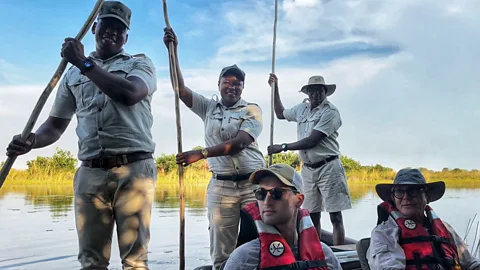 Carmen Roberts
Carmen RobertsMothogaathobogwe's description is spot on. To take a ride on an iconic dugout canoe through the waters of the Okavango Delta is a truly special experience. The delta itself is undoubtedly one of Africa's most extraordinary places – a two-million-hectare river system that's often referred to as the jewel of the Kalahari Desert. It shows up in stark contrast on satellite images as a bright blue-green patch set against the brown desert landscape.
Compared to other high-profile safari destinations, like Kruger National Park in nearby South Africa, humans have had very little impact on the Okavango. The Delta spans a colossal area of substantially undisturbed wetlands and seasonally flooded grasslands, and because of its vast size, access and development is difficult. Tourism to the inner Delta is limited to small, tented camps reached mainly by air.
Mothogaathobogwe is part of the indigenous Bayei tribe from Maun, who live on the outskirts of the Delta and follow a sustainable lifestyle that has long preserved the integrity of the Delta's many different habitats and inhabitants. The Bayei play a vital role in helping to stem poaching and farming threats on this Unesco World Heritage site, helping it sustain and support 264 mammal species, 157 species of reptiles and 540 species of bird as well as the world's largest population of elephants.
For centuries, locals have used mokoro to navigate the waterways. It's a smooth and near-silent ride, along reed and papyrus-lined canals in between larger lagoons, punctuated by water lilies. The poles, known as nkahsi, gently knock on the side of the mokoro, and the faint splashes as they break the surface of the water, along with the hum of insects, are the sounds of this aquatic safari. Today's mekoro (plural for mokoro) boats are made of fibreglass, a more sustainable and eco-friendly alternative to the traditional ebony, mangosteen or sausage tree wood.
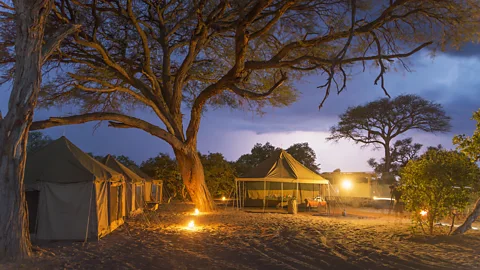 Buena Vista Images/Getty Images
Buena Vista Images/Getty ImagesAs she steers, Mothogaathobogwe scans the water's surface, wary of encountering hippos and crocodiles, all the while explaining the ecosystems we are gliding through. Her trained eye can spot the tiniest of green frogs latched onto a reed. This type of safari is in stark contrast to the typical, bumpy, four-wheeled game drives in search of the big five.
As Mothogaathobogwe picks a water lily and fashions it into a necklace, she reflects on what her life would be like if it weren't for this tourism opportunity.
"In the olden days, it used to be that the women would take the mokoro out and collect grass for building materials. Now it has changed and slowly, slowly, women are getting into the industry; we are taking tourists into the Delta with a mokoro," she said.
Women in the safari industry have historically faced challenges due to the stereotypical belief that guiding is a rugged, outdoor occupation that requires huge amounts of physical strength in the wilderness – not to mention the remote working conditions that take you away from family for long periods of time. These preconceived conditions have always put women at a disadvantage.
But there's now a growing movement in Africa to empower its women. Further north in the Delta, Chobe Game Lodge has a team of all female Batswana safari guides. Safari tour operator African Bush Camps launched a Female Guide Program in 2021. The two-year training accepts five women annually, focusing on skills like driving and animal tracking; last year they had more than 200 applicants. Meanwhile, on the plains of the Serengeti in Tanzania, Asilia Africa's Dunia Camp has been hailed as one of Africa's first all-female run safari camps, employing only women as chefs, guides, managers and housekeepers.
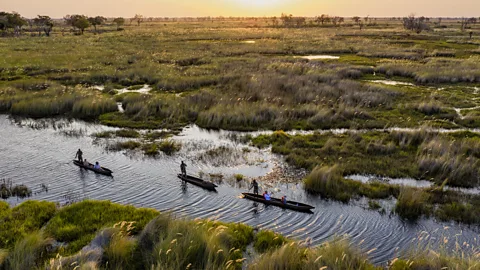 Martin Harvey/Getty Images
Martin Harvey/Getty ImagesMothogaathobogwe and her poling colleague Beauty are two of only a handful of female mokoro polers gainfully employed in the African safari industry. They are a part of the Ker and Downey Women Empowerment Scheme, a deliberate move to employ women in traditionally male-dominated roles, such as mokoro polers and mechanics.
"This initiative is part of our broader commitment to challenge stereotypes and promote diversity in the safari industry, reflecting our belief that talent knows no gender boundaries," explained MC Odumetse, group managing director for Chobe Holdings Ltd.
And with the growing employment and empowerment of women in the safari industry, the knock-on effect on local communities is immense – not only leading to improved economic welfare and stability of households, but also the education of children and the overall morale of the community.
"My community are very impressed; [they] are very highly motivated by me. I would say I am their inspiration, and they are learning from me. Whenever I get back there, they are so happy and they say – 'well done Cindy, keep going'," Mothogaathobogwe said.
In an era where narratives of female empowerment resonate globally, Mothogaathobogwe and her comrades have been embraced by solo female travellers looking for a more relatable and authentic experience.
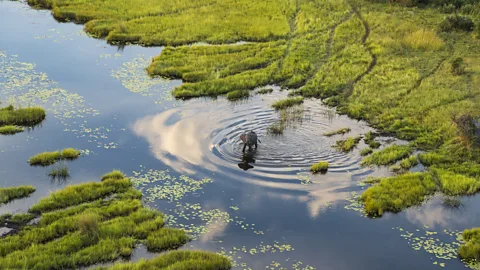 Peter Evans/Getty Images
Peter Evans/Getty Images"Some of the tourists, they want to go with a female guide because I think they feel they can relate to me more," she said. "[Up till now], all the guides have been men, and when they hear that there is a female guide here, they are so happy and they say, 'Can we please go with Cindy'."
Like in many other industries, women can provide a different perspective on a safari tour, and Mothogaathobogwe's knowledge of nature is clear. She plucks a flat leafed plant from the delta and explains that this is what's known as a "water shield", turning it over to reveal a gelatinous substance covering the roots and divulging that rubbing this natural jelly on your skin is a local, homegrown remedy for keeping mosquitos at bay.
"It makes me feel very happy," Mothogaathobogwe said. "I love nature and to be able to share the secrets of my homeland and tribal traditions with tourists gives me a great sense of pride as well as peace."
---
If you liked this story, sign up for The Essential List newsletter – a handpicked selection of features, videos and can't-miss news delivered to your inbox every Friday.
